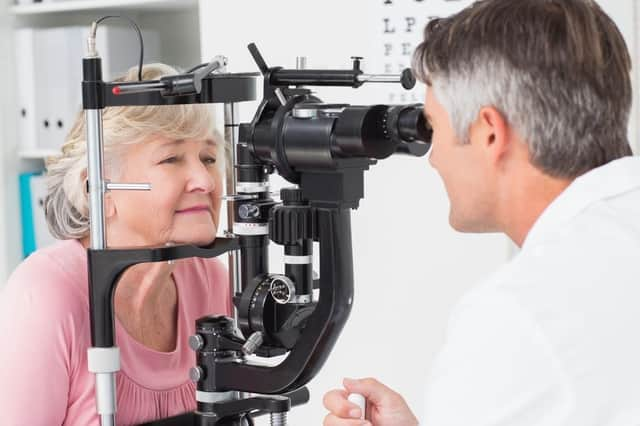Eye specialists call for screening programme to prevent blindness in old age


Eye specialists are calling for a national screening programme to identify people at risk of going blind in old age.
And they want to encourage greater use of dietary supplements that may reduce the risk.
Advertisement
Hide AdAdvertisement
Hide AdAt least two in five people carry genes which put them in danger of losing their vision because of age-related macular degeneration (AMD), a condition which begins as an inability to distinguish colour which most people don’t notice.
It is estimated 600,000 people in Britain are affected, including 10 per cent of those aged 65 or older, and cigarette smoking makes the risk five times higher.
Trials are due to begin later this month among a random group of 500 people of all ages who will be invited for screening for AMD during routine eye tests at 10 opticians practices to spot early signs using AzulOptics, a tool developed at Bristol University.
Meanwhile a major European Union project will be launched next year inviting people to send a saliva sample to test for 50 different genetic characteristics that increase the risk.
Gene test
Advertisement
Hide AdAdvertisement
Hide AdResearchers' interest into the effects of macular carotenoids in dealing with macular degeneration has been intense of late.
In the last six months, there have been six clinical studies published in science journals reporting on the positive effect of the botanicals, lutein, zeaxanthin, lycopene and other carotenoids, with macular degeneration.
A number of other research projects, including a major clinical trial involving more than 5,000 people by the American government’s Age Related Eye Disease Study (AREDS), have also shown that dietary supplements including lutein and zeaxanthin can halt or even reverse progress of the disease in susceptible people.
Dr Shelby Temple, a senior specialist at Bristol University is leading the development of an ophthalmic instrument which will enable the “rapid and cost-effective screening” of patients to determine their susceptibility to AMD.
Advertisement
Hide AdAdvertisement
Hide AdDr Cecile Delcourt, director of research at France’s National Health and Medical Research Institute, is developing the gene test for macular degeneration.
Both Dr Temple and Dr Delcourt are strong advocates of the supplements but they are frustrated by the lack of government interest in promoting their use.
Dr Delcourt said: “There are 15 million Europeans at risk of this condition.
Supplementary information
"We know nutrition is really important and I would recommend taking the specific supplements identified by the research."
Advertisement
Hide AdAdvertisement
Hide AdDr Temple, who last year was named Biotechnology and Biological Sciences Research Council Innovator of the Year, said: “People with low levels of macular pigment in their 20s are at higher risk.
“There’s a lot of talk about prevention but little being done.”
Prof Alf Lindberg, Science Director at Cambridge Nutraceuticals, said: "e have been interested in the health benefits of lutein and zeaxanthin for some while which is why the company has developed an AREDS-compliant formulation called Vision+ utilising a patented lycopene delivery mechanism.
“Given the amount of positive clinical studies indicating their eye health benefits, we felt we must play a part in providing well researched products for people with eye concerns.
Advertisement
Hide AdAdvertisement
Hide Ad”Lutein and zeaxanthin protect your eyes from harmful high-energy light waves like ultraviolet rays in sunlight. Studies suggest that a high level of both in eye tissue is linked with better vision, especially in dim light or where glare is a problem.
Vitamins key
“Many studies combine these two nutrients with others such as vitamins C and E.
"It may be that the mix of nutrients does more for your eyes than any single one of them.”
The Royal National Institute for the Blind (RNIB) also recommends supplements to slow progression of AMD, but it says people aged over 60 are already entitled to free NHS AMD tests and should ask for them.
Advertisement
Hide AdAdvertisement
Hide AdBut, at the moment, the preventive dietary supplements are not available on the NHS and the only treatment is an injection directly into the eyeball using a substance called anti-VEGF, available to people aged over 65 with established disease.
Anti-VEGF costs the NHS millions of pounds a year, but many experts argue regular treatment with a dietary supplement would be considerably more effective.
In Ireland the influential Macular Pigment Research Group at the Waterford institute of Technology has repeatedly lobbied for free supplements.
A spokesman for the Group said: “A short-sighted failure to [pay for] proven antioxidant supplements to patients with non-advanced AMD is as immoral as it is financially stupid."